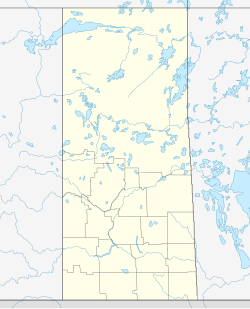Bladworth (2016 population: 65) is a village in the Canadian province of Saskatchewan within the Rural Municipality of McCraney No. 282 and Census Division No. 11. The village is located 99 kilometres (62 mi) south of the City of Saskatoon on Highway 11.
Bladworth | |
|---|---|
| Village of Bladworth | |
 Grain elevator in Bladworth | |
Location of Bladworth in Saskatchewan | |
| Coordinates: 51°21′58″N 106°08′17″W / 51.366°N 106.138°W | |
| Country | Canada |
| Province | Saskatchewan |
| Region | Central |
| Census division | 11 |
| Rural Municipality | McCraney |
| Government | |
| • Mayor | Ron Bessey |
| • Administrator | Donna Bessey |
| • Governing body | Bladworth Village Council |
| Area | |
• Total | 0.84 km2 (0.32 sq mi) |
| Population (2011)[1] | |
• Total | 60 |
| • Density | 71.2/km2 (184/sq mi) |
| Time zone | UTC-6 (CST) |
| Postal code | S0G 0L0 |
| Area code | 306 |
| Highways | Highway 11 |
| [2][3][4] | |
History
editBladworth incorporated as a village on July 27, 1906.[5]
- Heritage properties
Bladworth is the site of a Saskatchewan Municipal Heritage property, a two-story brick house clearly visible from adjacent Highway 11. The J. Fred Johnston house is named for its builder, a Saskatchewan entrepreneur, Liberal Member of Parliament and later a Senator, from 1943 to 1948.[6]
Demographics
editIn the 2021 Census of Population conducted by Statistics Canada, Bladworth had a population of 71 living in 28 of its 36 total private dwellings, a change of 9.2% from its 2016 population of 65. With a land area of 0.87 km2 (0.34 sq mi), it had a population density of 81.6/km2 (211.4/sq mi) in 2021.[9]
In the 2016 Census of Population, the Village of Bladworth recorded a population of 65 living in 29 of its 38 total private dwellings, a 7.7% change from its 2011 population of 60. With a land area of 0.84 km2 (0.32 sq mi), it had a population density of 77.4/km2 (200.4/sq mi) in 2016.[10]
Notable people
edit- Greg Brkich (born 1958), politician
- Gordon Stewart Northcott (1906-1930), serial killer and rapist
- Rod Sarich (born 1981), ice hockey player
See also
editReferences
edit- ^ "2011 Community Profiles". Statistics Canada. Government of Canada. Archived from the original on 2019-01-06. Retrieved 2014-08-21.
- ^ National Archives, Archivia Net. "Post Offices and Postmasters". Archived from the original on 2006-10-06. Retrieved 2014-08-21.
- ^ Government of Saskatchewan, MRD Home. "Municipal Directory System". Archived from the original on 2016-01-15. Retrieved 2014-08-21.
- ^ Commissioner of Canada Elections, Chief Electoral Officer of Canada (2005), Elections Canada On-line, archived from the original on 2007-04-21
- ^ "Urban Municipality Incorporations". Saskatchewan Ministry of Government Relations. Archived from the original on October 15, 2014. Retrieved June 1, 2020.
- ^ Canada's Historic Places. "J. Fred Johnston House". Archived from the original on 2014-09-05. Retrieved 2014-08-21.
- ^ "Saskatchewan Census Population" (PDF). Saskatchewan Bureau of Statistics. Archived from the original (PDF) on September 24, 2015. Retrieved May 31, 2020.
- ^ "Saskatchewan Census Population". Saskatchewan Bureau of Statistics. Retrieved May 31, 2020.
- ^ "Population and dwelling counts: Canada, provinces and territories, census divisions and census subdivisions (municipalities), Saskatchewan". Statistics Canada. February 9, 2022. Retrieved April 1, 2022.
- ^ "Population and dwelling counts, for Canada, provinces and territories, and census subdivisions (municipalities), 2016 and 2011 censuses – 100% data (Saskatchewan)". Statistics Canada. February 8, 2017. Retrieved May 30, 2020.
51°21′58″N 106°08′17″W / 51.366°N 106.138°W

